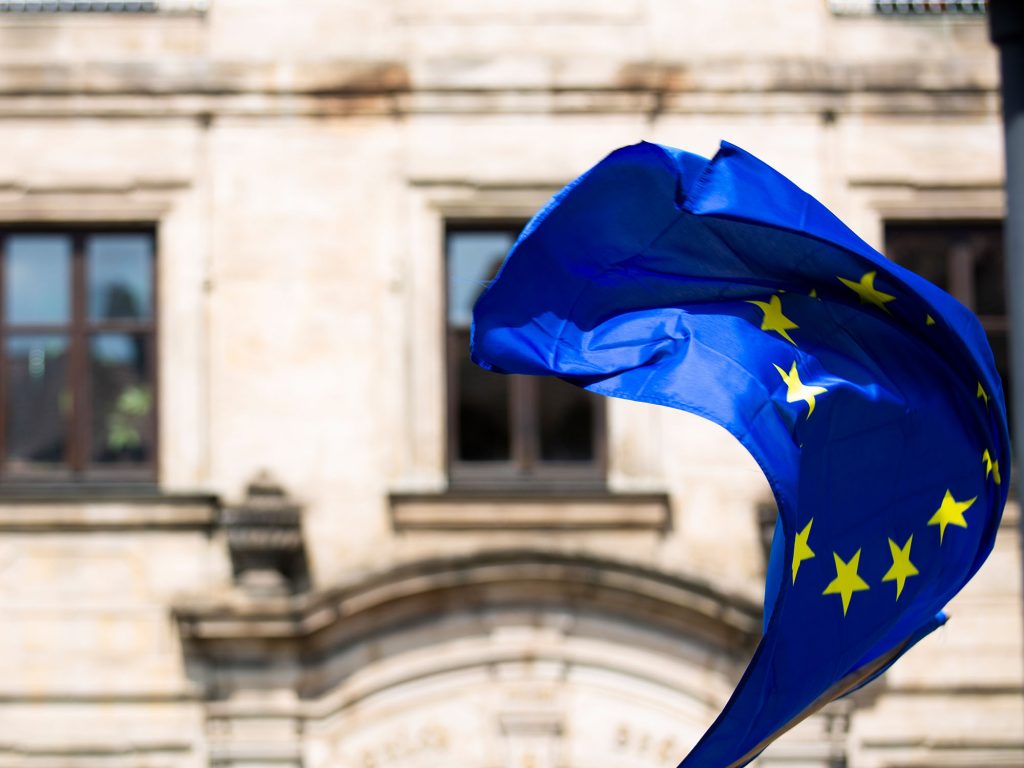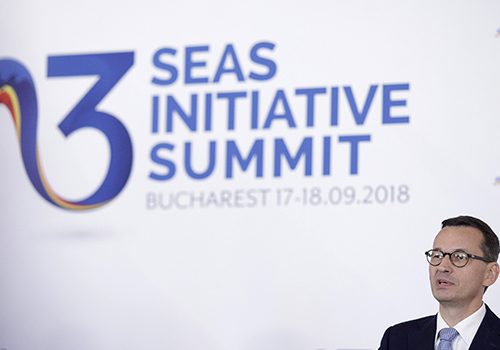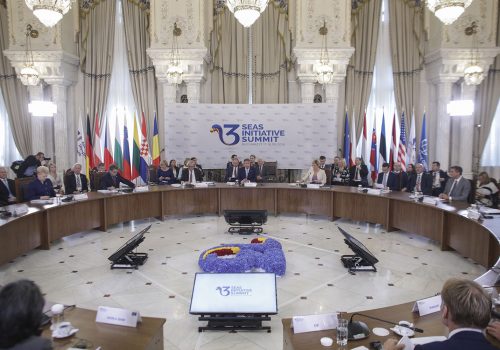On March 25, 2021, the Atlantic Council’s Europe Center organized a strategy session on “Completing Europe: The Three Seas Initiative,” convened by Gen. James L. Jones, Jr. and Ambassador Georgette Mosbacher, Chairman and Co-Chair of the Atlantic Council’s Three Seas Programming. The roundtable featured opening remarks by Congresswoman Marcy Kaptur (D-OH) who has lead Congressional support for the Initiative.
In her opening remarks, Congresswoman Kaptur thanked the Atlantic Council for its support of the Three Seas Initiative and discussed the urgent need for infrastructure development in Central and Eastern Europe to combat attempts to disrupt the transatlantic alliance through hybrid warfare, energy coercion, and compromised cyber hardware. She highlighted the growing support for the Three Seas Initiative on both sides of the Atlantic and its bipartisan support in Congress.
Congresswoman Kaptur specifically restated her support for the commitment by the United States to invest $1 billion in Europe’s energy security through the Three Seas Initiative, and reiterated her expectation for the US Development Finance Corporation to honor its decision to invest $300 million into the Three Seas Initiative Investment Fund. That decision was announced before Three Seas heads of state at a summit meeting in Tallinn, Estonia in October 2020.
Congresswoman Kaptur also discussed the Transatlantic Telecommunications Security Act that she and Congressman Adam Kinzinger introduced to the House of Representatives last year. She expressed confidence that the Three Seas Initiative would have a significant, constructive, and lasting impact on infrastructure security, digital sovereignty, and the transatlantic alliance.
Congresswoman Kaptur’s remarks are below.
Transcript of Congresswoman Kaptur’s Remarks
Thank you, General Jones, for that warm greeting, and I am very honored to be in your company, and all of those who are listening at the invitation of the Atlantic Council, all of our friends for organizing this extremely timely event.
Many of you know I co-chair and helped found the Congressional Ukraine Caucus, the Polish Caucus, and the Hungarian Caucus, and am a Member of the Baltic Caucus, so I wish to join in welcoming our audience in the transatlantic community for this important conversation entitled, “Completing Europe: The Three Seas Initiative.”
What a pleasure to see Ian Brzezinski again. I am so grateful for his leadership and commitment to liberty and infrastructure security in Central and Eastern Europe.
I have fond memories of working in the Carter Administration, in which your father served as National Security Advisor— and what a distinguished Polish American family you have, and what a brilliant, brilliant father he was.
I also want to thank Ambassador Dick Morningstar and Ambassador Kurt Volker for joining into this important discussion, and I thank Nicholas Kazvini-Gore of my own staff for helping me prepare for this.
Let me address briefly the Three Seas Initiative.
As you well know, the Three Seas Initiative is led by twelve of our closest NATO and European Union allies in Central and Eastern Europe, we wish to thank them.
Unfortunately, the Soviet-Communist legacy left this strategic region with a significant infrastructure deficit, especially along the north-south lines.
I could tell so many stories about traveling by train and reaching the Soviet border, and then the train being lifted up and the track changed to accommodate their security needs, and wasting all that time at the border.
Nonetheless, key to addressing these gaps that currently remain are to build cross-border energy, digital, and transportation infrastructure resilience in the region, and these gaps leave the region overly dependent on Russia and China for energy and economic needs.
Unfortunately, these malign actors seek to sow discord in the transatlantic alliance and other places through hybrid warfare operations, energy coercion, compromised cyber hardware, and the export of authoritarian ideals that have even reached our domestic shores.
In 2006 and 2009, Russian authorities cut off gas flows through Ukraine during the winter, leading to hardship not only for the people of Ukraine, but also neighboring countries like Bulgaria and Romania.
Currently, the Nord Stream 2 pipeline is 95 percent complete, and would only increase Russia’s leverage over Europe. It would also put the security of Ukraine at risk, a nation facing down Russia’s illegal war with now over 14,000 innocents dead.
In response, the Congress has now voted twice to sanction the pipeline, and while I am encouraged by recent statements by Secretary Blinken that the Administration will comply with this legislation, I strongly urge the Administration to apply sanctions more swiftly on the pipeline to ensure it never sees completion.
The State Department must also make clear that the Congress will not support a side-deal that puts the region’s security at risk.
Additionally, China has used opaque debt-traps and predatory investments through its Belt and Road Initiative to undermine Europe’s transatlantic cyber security.
I can guarantee you in my own district, China is hacking some of our most precious technology in firms hundreds and hundreds of times a week.
Thankfully, our closest allies and partners in Central and Eastern Europe established the Three Seas Initiative to accelerate regional infrastructure development by leveraging investment from international financial institutions and the private sector.
I enthusiastically support these efforts, and was pleased to join my Republican colleague Adam Kinzinger to introduce House Resolution 672 to support the Three Seas Initiative and Fund.
This resolution passed the US House of Representatives last year unanimously demonstrating the robust bipartisan support for the initiative.
Following the introduction of this resolution, I was thrilled the United States announced a $1 billion pledge to invest in Europe’s energy security through the Three Seas Fund.
To further demonstrate bipartisan support for this investment in the Three Seas Fund, I led a bipartisan letter to President Biden urging him to honor the pledge to our allies.
I am so thankful for President Biden’s commitment to Central and Eastern Europe. He was just here in Ohio this week. I recalled with him our trip together in 2015 to Ukraine for President Poroshenko’s inauguration. He fully understands the threat from Russia and the need to stand shoulder to shoulder with our allies. It is in his DNA.
I fully expect the United States Development Finance Corporation to honor the pledge to invest $300 million of the currently approved financing into the Three Seas Fund given the clear US national security interests.
I am also thankful for the leadership of the Three Seas nations and embassies, particularly Bulgaria who serves as this year’s chair, in their advocacy for Three Seas. Thank you so much.
I invite the Czech Republic, Austria, Slovakia, as well as the European Union and Germany to join these efforts by investing into the fund.
Let me turn very quickly to the Transatlantic Telecommunications Security Act.
To further build on this program, I was pleased to introduce last year the Transatlantic Telecommunications Security Act (HR 8899) with my colleague, again, Adam Kinzinger.
This legislation would allow the United States to provide financing to our allies and partners in Central and Eastern Europe to shore up their telecommunications and cyber networks.
Currently, China seeks to compromise allied cyber networks by using state-linked companies like Huawei and ZTE who induce our allies to buy insecure equipment and services with debt-trap financing.
Bipartisan current and former US officials and civil society members have recognized the threat of malign influence, surveillance, and cyberattacks through critical telecommunications networks.
Fifth generation cyber networks will also serve as the backbone of artificial intelligence platforms with immense national security and domestic economic implications.
Secure telecommunications are also critical for military interoperability with our European allies at a time when NATO coordination is needed now more than ever.
I’m thankful to Chairman Meeks who was an original cosponsor in the last Congress, and for the support of Ranking Member McCaul in this Congress in their work in terms of international relations and foreign affairs.
I am hopeful that Chairman Meeks will again support this legislation, so we can once again introduce the legislation and work towards its swift passage. He holds a deep and abiding interest in Europe.
In conclusion, let me just say that I am grateful for your critical work and advocacy for the Three Seas Initiative. I find it truly exciting, and yes, as a city and regional planner, especially exciting.
Under the current chairmanship of Bulgaria, I am confident we will be able to make even further strides to boost infrastructure security in Central and Eastern Europe.
I look forward to our continuing conversation, which I am sure will be insightful and productive.
Thank you all. Thank you all liberty lovers.
Related Reading

Europe Center
Providing expertise and building communities to promote transatlantic leadership and a strong Europe in turbulent times.

